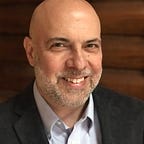Graduation Day
Forty years ago this week, I graduated from college. My cousin got his bachelor’s a couple of years before me. So I was No. 2 in our family’s first generation of college grads. If we widen the circle to include my father’s cousins, there probably were a few earlier college graduates among us (I recall only one). But, among my closest relatives — grandparents, parents, aunts, uncles, and first cousins — we were the first.
That distinction resonated with me because my three surviving grandparents attended my graduation ceremony. My parents, of course, had much more to do with directly influencing my college-bound trajectory and helping me pay for my undergrad education. But a milestone like a college graduation, especially a first-generation achievement, can focus the mind on earlier generations’ roles in making this possible.
This photo shows my father’s parents with me immediately after the ceremony. I grew up next door to them and they’d always been a big part of my life. They came to this country as children, from the same small town in Sicily. I had the privilege of visiting that town four years ago as the first in our extended family to step foot on those streets in more than 100 years. By 1980, when this photo was taken, they had lived a good life. It was not without its sorrow — just months earlier, they were devastated by the loss of their oldest grandchild, my beautiful cousin Mary — but they focused their lives on the joys of family.
I have looked with gratitude and pride at this photo many times. I thought of this moment when my own children graduated from college. And, at the many graduations I attended when I taught at Syracuse University, I looked out at the gray grandparent heads that dotted the audience and wondered how many of them had my grandparents’ experiences of emigrating to this country, making a life and family, and seeing the next generations stand on their shoulders. That is how it’s supposed to work — a progression from one generation to the next. Not that progress always depends on college. My grandmothers’ and parents’ formal education ended with high school; my grandfathers went to work before they could finish. They were among the smartest people I’ve known. My career dreams, however, depended on college.
The summer of my graduation, I worked as a reporter intern at the local morning newspaper. True to their working-class roots, my grandparents subscribed only to the afternoon paper (morning papers were for fancy office workers). So I made a point of walking next door with copies of the first papers containing my byline, to show them. I’d only been at that internship a few weeks when I got the call at my desk that my grandfather had died unexpectedly of a heart attack. As sad as I was to lose him, I was happy that he got to see my graduation and read those first stories.
I’d lived at home and commuted to college in my undergrad years, so I had continued to be a part of my grandfather’s life, plowing the snow from his driveway, driving him places, helping him weed and pick the vegetables that he sold on his roadside farm stand. Less than two months after his death, I left home for the first time, to attend graduate school halfway across the country. I visited home often over the years, but I never lived there again. Those visits home became especially painful when Parkinson’s disease robbed my grandmother of her speech. When I sat next to her, she would hold my hand tightly with a grip still so strong, from her years as a farmer’s wife, that it hurt. What hurt more was the wordless stare she fixed on me, with a burning love she expressed through her tear-filled eyes.
A 40th college-graduation anniversary seems mostly worth avoiding as a topic, since it draws attention to how damned old I am (and, yes, it definitely opens the floor to comments about all that windblown hair). But at least it gives me the opportunity to say thank you to Charlie and Mary Obbie for making the American dream of advancement possible for me, my generation, and those to come.
